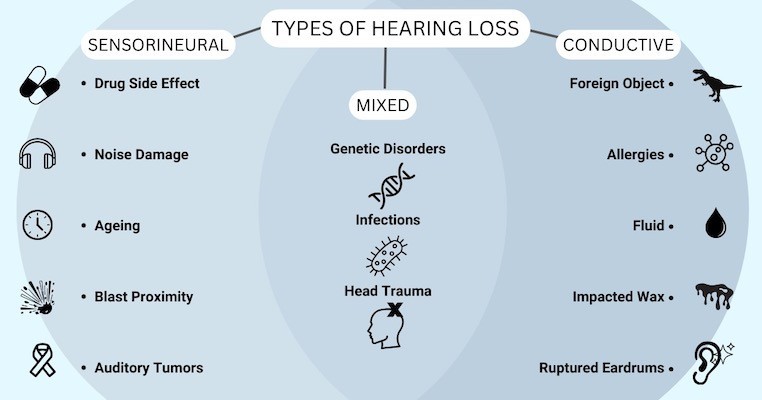Free home visits
with a local audiologist

Head of Online Medical Content

Audiology Expert at Hearing Aid UK

Introduction | What is mixed hearing loss | Causes | Symptoms | Diagnosing | Treatment | Living with mixed hearing loss | Conclusion
Mixed hearing loss has elements of both conductive and sensorineural hearing loss. To simplify, the outer ear is unable to conduct sound successfully to the inner ear, and the inner ear cannot process sound sent to the brain.
Amongst the different types of hearing loss, mixed hearing loss stands out due to its unique combination of characteristics. Managing mixed hearing loss can be challenging, as those with this condition often struggle to understand sounds and speech, and what they do hear tends to be very faint.
In this article, we briefly look at what mixed hearing loss is, how it occurs, and what it means for those who have it.
Mixed hearing loss is a condition where both conductive hearing loss and sensorineural hearing loss are present. When a person has both conductive and sensorineural hearing loss, they are diagnosed with mixed hearing loss.
This combination can make the condition more challenging to diagnose and treat because it involves issues in several parts of the auditory system. To understand mixed hearing loss, it's essential to grasp the basics of its two components:
Conductive hearing loss: This type of hearing loss occurs when there is an issue in the outer or middle ear that prevents sound from being conducted properly to the inner ear. Common causes include ear infections, fluid in the middle ear, earwax buildup, or abnormalities in the ear's structure.
Sensorineural hearing loss: This type occurs when there is damage to the inner ear (cochlea) or the auditory nerve pathways. It is often permanent and can be caused by ageing, exposure to loud noises, head trauma, or certain medical conditions.

Mixed hearing loss is caused by a combination of conductive and sensorineural hearing loss. Therefore, the most common causes of mixed hearing loss are similar to those of conductive and sensorineural hearing loss, including:

The symptoms of mixed hearing loss can vary widely, but common signs include:
Diagnosing mixed hearing loss typically involves a thorough evaluation by an audiologist. The process includes:
Treating mixed hearing loss requires many approaches that address both conductive and sensorineural hearing loss. Common treatment options include:

Living with mixed hearing loss can be challenging, but many learn how to successfully manage their condition with the right support and strategies. Here are some basic tips for coping with mixed hearing loss:
Mixed hearing loss combines both conductive and sensorineural hearing loss. Although it can't be entirely "corrected," the quality of hearing can be improved with various treatment options. The effectiveness of these treatments depends on the severity of the loss and whether it is primarily caused by conductive or sensorineural factors.
Mixed hearing loss combines conductive and sensorineural issues, affecting both the outer and inner ear.
Treatments like hearing aids, medications, or surgery can improve hearing, depending on severity and causes.
By understanding the causes, symptoms, and available treatment options, those with mixed hearing loss can improve their hearing and quality of life.
While the challenges are significant, advancements in medical technology and hearing aids continue to provide support for those with mixed hearing loss.
 I have difficulty hearing in noisy places
I have difficulty hearing in noisy places  High-Pitched Sounds Like Birdsong Are Fading. Do I Have Hearing Loss?
High-Pitched Sounds Like Birdsong Are Fading. Do I Have Hearing Loss?  Asking people to repeat themselves frequently. Do I have hearing loss?
Asking people to repeat themselves frequently. Do I have hearing loss? Do not spend hundreds of pounds without getting a second opinion from us.
 Not only are the prices great, but the service is fantastic! Many thanks to your team.
Not only are the prices great, but the service is fantastic! Many thanks to your team.If you are looking at this page then it is likely that an audiologist has suggested that you purchase this particular hearing aid, so is this the best model for you?
In general, any audiologist will always recommend to you the model that best suits your needs. Here is a useful checklist to make sure that is the case.
If in doubt, feel free to give us a call. That's what we're here for. In the meantime, read all about our review of the best hearing aids for 2025 here
If you have significant hearing loss in both ears, you should be wearing two hearing aids. Here are the audiological reasons why:
Localisation: The brain decodes information from both ears and compares and contrasts them. By analysing the minuscule time delays as well as the difference in the loudness of each sound reaching the ears, the person is able to accurately locate a sound source. Simply put, if you have better hearing on one side than the other, you can't accurately tell what direction sounds are coming from.
Less amplification is required: A phenomenon known as “binaural summation” means that the hearing aids can be set at a lower and more natural volume setting than if you wore only one hearing aid.
Head shadow effect: High frequencies, the part of your hearing that gives clarity and meaning to speech sounds, cannot bend around your head. Only low frequencies can. Therefore if someone is talking on your unaided side you are likely to hear that they are speaking, but be unable to tell what they have said.
Noise reduction: The brain has its own built-in noise reduction which is only really effective when it is receiving information from both ears. If only one ear is aided, even with the best hearing aid in the world, it will be difficult for you to hear in background noise as your brain is trying to retain all of the sounds (including background noise) rather than filtering it out.
Sound quality: We are designed to hear in stereo. Only hearing from one side sounds a lot less natural to us.
Fancy some further reading on this topic? You can read about why two hearing aids are better than one in our article, hearing aids for both ears, here
For most people, the main benefit of a rechargeable hearing aid is simple convenience. We are used to plugging in our phones and other devices overnight for them to charge up. Here are some other pros and cons:
For anybody with poor dexterity or issues with their fingers, having a rechargeable aid makes a huge difference as normal hearing aid batteries are quite small and some people find them fiddly to change.
One downside is that if you forget to charge your hearing aid, then it is a problem that can't be instantly fixed. For most a 30-minute charge will get you at least two or three hours of hearing, but if you are the type of person who is likely to forget to plug them in regularly then you're probably better off with standard batteries.
Rechargeable aids are also a little bit bigger and are only available in Behind the Ear models.
Finally, just like with a mobile phone, the amount of charge you get on day one is not going to be the same as you get a few years down the line. Be sure to ask what the policy is with the manufacturer warranty when it comes to replacing the battery.
Looking for more information on rechargeable hearing aids? Read our dedicated page on the topic here
For most people, the answer is yes. But it's never that simple.
The majority of hearing problems affect the high frequencies a lot more than the low ones. Therefore open fitting hearing aids sound a lot more natural and ones that block your ears up can make your own voice sound like you are talking with your head in a bucket. Therefore in-ear aids tend to be less natural.
However the true answer is we can't tell until we have had a look in your ears to assess the size of your ear canal, and until we have tested your hearing to see which frequencies are being affected.
People with wider ear canals tend to have more flexibility, also there are open fitting modular CIC hearing aids now that do not block your ears.
There is also the age old rule to consider, that a hearing aid will not help you if it's sat in the drawer gathering dust. If the only hearing aid you would be happy wearing is one that people can't see, then that's what you should get.
Most people can adapt to any type of hearing aid, as long as they know what to expect. Have an honest conversation with your audiologist as to what your needs are.
Generally speaking, six or more. Unless it's none at all.
The number of channels a hearing aid has is often a simplistic way an audiologist will use to explain why one hearing aid is better than another, but channels are complex and it is really not that straightforward. Here are some reasons why:
Hearing aids amplify sounds of different frequencies by different amounts. Most people have lost more high frequencies than low and therefore need more amplification in the high frequencies. The range of sounds you hear are split into frequency bands or channels and the hearing aids are set to provide the right amount of hearing at each frequency level.
Less than six channels and this cannot be done with much accuracy, so six is the magic number. However, a six channel aid is typically very basic with few other features and is suitable only for hearing a single speaker in a quiet room. The number of channels is not what you should be looking at, it's more the rest of the technology that comes with them.
As a final note, different manufacturers have different approaches. One method is not necessarily better than any other. For example, some manufacturers have as many as 64 channels in their top aids. Most tend to have between 17 and 20. One manufacturer has no channels at all.
Hearing aids are easily lost, misplaced or damaged and typically are one of the most expensive personal possessions an individual can own. We offer hearing aid warranty coverage for £80 per year per aid. Find out more about this service we provide here
All our audiologists use the very latest technology and provide the full range of tests to accurately measure your hearing for free. Find out about what hearing healthcare services we offer all our customers here
Hearing Aid UK offers all their customers free home visiting services, even in a care home environment, for no extra cost. Including hearing tests, fittings, maintenance, check-ups and much more in the comfort of your own home and at your convenience. Find out more information about our home visits here
Here, at Hearing Aid UK, we are dedicated to offering low hearing aid prices. We achieve this by having no head office and low marketing costs. Our hearing aid prices are amongst the lowest you will find anywhere in the world. Explore our prices, brands, and models here
When we refer to a product as 'Latest Launch', we mean it is the latest to be released on the market.
When we refer to a product as 'New', we mean that the product is the newest hearing aid model on the market.
When we refer to a product as 'Superseded', we mean that there is a newer range available which replaces and improves on this product.
When we refer to a product as an 'Older Model', we mean that it is has been superseded by at least two more recent hearing aid ranges.